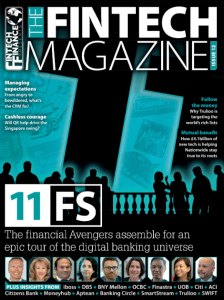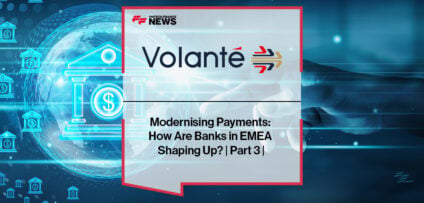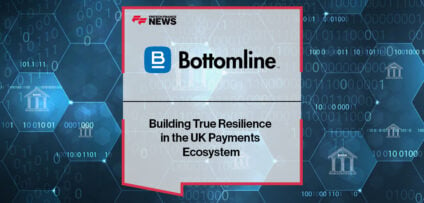Breaking News

NO SWEAT!
The tiny city-state of Singapore has a big reputation when it comes to fintech acceleration. As Chief Data and Transformation Officer for DBS – one of the largest and best known of the South East Asian banks based there – we asked Paul Cobban how it keeps up
The Fintech Magazine: DBS has been busy re-engineering its services to be predictive and pre-emptive of customer needs, based on better collection and interrogation of data. What have been some of the core milestones in that journey?
Paul Cobban: The real turning point for our realisation of the power of data was probably around eight years ago when we entered into a joint venture with A*STAR, the Singapore government’s research and development arm. Banks have been using data for marketing and credit forever, but A*STAR showed us how predictive analytics could be used to, for example, tell us when one of our branches was going to have an operational error, or even which one of our relationship managers was about to resign! So we woke up to the realisation that the data we already possessed, had immense power that we hadn’t unlocked. But it was actually quite hard to get access to our own data, because of the banks’ policies. Gradually, we’ve increased the velocity and number of data analytics projects and we’re seeing more and more value emerge as a consequence. Now, we’re supplementing that data with instrumentation, some experiments and, increasingly, data from external sources.
TFM: What does that mean for customers on the ground?
PC: We’re embracing the concept of customer science, which is using data to provide world-beating customer experience. So, every swipe you make on our apps, every button pressed, every pause, every time you abandon a journey, we capture that in real-time and put it in the Cloud. That enables us to identify where our customers are struggling so that we can intervene and help. Importantly, we can also see where groups of customers are struggling, so that gives us an indication of where we need to redesign aspects of our service. Even more important than that, we can start to use data analytics to predict customer behaviour and so prevent problems in the first place. That’s the direction data allows us to take our customer experience in.
You mentioned you store some data in the Cloud. How much of the bank’s operation is now Cloud-based?
PC: We use the public Cloud for certain applications, but we want to be quite cautious in our migration to that. So, our primary investment has been on our on-premise but Cloud-ready solution stack, which gives us scalability and security, but also starts to give us access to some of the data science tools we need.
Companies like Amazon with AWS (Amazon Web Services), are releasing product features all the time and we can’t possibly keep up with them, so the priority for us is to move our data, as opposed to our applications, to the public Cloud, in order to access this emerging technology. But we’re going to go very cautiously because customer data is obviously very sensitive and we need to make sure that we’ve all the controls in place before we make any major shift.
Over time it may well be the case that it improves security, but it’s still a fairly immature area and every company that moves to the Cloud does it in a slightly different way. So, we have to be very clear about what our threshold is. We’re still on that journey.
TFM: DBS is a large institution compared to some of those beginning to compete in your space. How do make sure you are as agile as them?
PC: Ten years ago, when our CEO Piyush Gupta joined, we made a decision that was counter intuitive, or counter to what everybody else was doing at the time, but is really reaping dividends now. We took an approach to transformation that is T-shaped. The broad part of the T is about encouraging everybody in the company to participate, to have a go – we’re not going to hold anyone accountable, it’s all about the participation. The deep part of the T is where we provide management focus, resources and investment to try to maximise the benefit in those areas.
We’ve repeated that model, through operational excellence, customer experience, innovation, data… and it works for us. It has enabled us to sustain the rate of change we have seen at DBS.
TFM: Do you think it’s been easier and quicker to realise that innovation here in Singapore than it might be if you were based elsewhere in South East Asia?
PC: We’re fortunate to have such an amazing infrastructure in Singapore. We have a progressive regulator and Singapore attracts the world’s best talent because it’s such an amazing place to live. But we are a regional player, too – we’re not just in Singapore and we have great sources of talent across the region. As DBS’s brand has grown stronger, we’re finding, more and more people want to come to work with us.
We have also been very innovative in the way we bring people onboard – using hackathons to attract the very best engineers here in Singapore and also in Hyderabad in India. We’ve been completely blown away by the quality of people that come through that process and who have ended up working with us.
TFM: Singapore is continually in the financial technology news. It’s ranked among the top five fintech hubs in the world and, for two years running, it has hosted Money20/20, attracting an international audience that is predominantly interested in what is happening here around payments. Are you surprised by all of this?
PC: Well, I think payments is an area that is at the very heart of banking and DBS’s strategy has been about recognising that and building ecosystems off the back of it.
It’s a very crowded space and it’s very competitive, even here in Singapore, where DBS has a strong presence. You could see that as both a threat and an opportunity. So, we’re putting a lot of focus on building out an ecosystem.
At the heart of it is our API (application programming interface) portal, where we’ve 300 APIs now exposed, which we think is the largest banking portal in the world with well over 100 API partners using it. So, in payments, it’s going to be tough but we’re not complacent.
As to Singapore’s reputation, when you think about, it’s a tiny little country and this little red dot is attracting all this attention and infrastructure, and innovative thinking… it’s quite phenomenal.
This article was published in The Fintech Finance Magazine: Issue #12, Page 81.
- Finnovex Saudi Arabia 2025 – Post-Show Highlights Read more
- Modernising Payments: How Are Banks in EMEA Shaping Up? | Part 3 | Volante Technologies Read more
- Building True Resilience in the UK Payments Ecosystem | Part 7 | Bottomline Read more
- Cheaper, Faster… Riskier: Over Half Of Brits Plan To Use ChatGPT For Completing Their Tax Returns Read more
- Tuum and Abwab.ai Partner to Deliver End-to-End SME Lending Solutions in the Middle East Read more



















